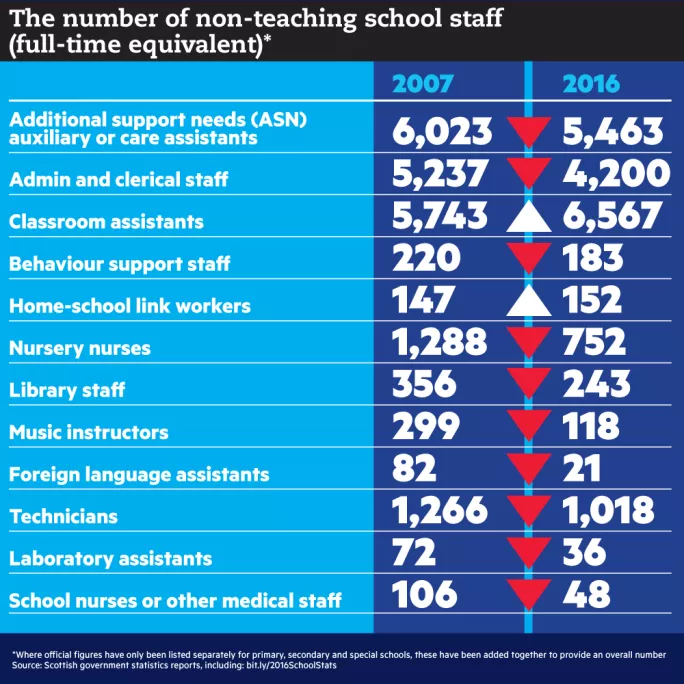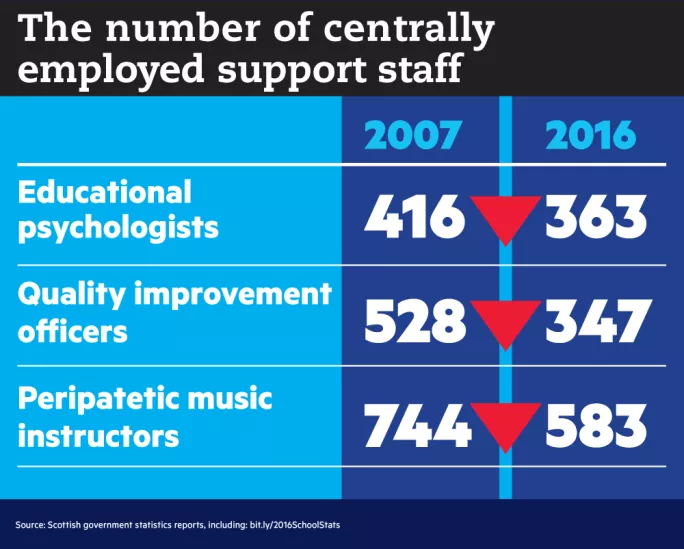Teachers left to cope after cuts to support staff

The “depressing” decline in school support staff over the past decade has been laid bare by new TESS analysis, amid claims that teachers have been left with greater levels of responsibility and higher workloads than ever before.
Almost every category of support staff has seen a sharp fall in numbers and even one group that has not - classroom assistants - is widely seen as unable to provide the same help that it once did.
The period since the SNP was first elected in 2007 has brought falls in school-based staff (see graphic, below), including administrative and clerical staff (down by 20 per cent) and additional support needs (ASN) auxiliary or care assistants (9 per cent). Centrally employed staff such as quality improvement officers (down 34 per cent) and educational psychologists (13 per cent) have also declined.
However, since 2007, the pupil population has only decreased marginally (by 2 per cent). The proportion of children recorded as ASN has risen from 5.3 per cent in 2007 to the current 22.5 per cent, after a change in how additional needs are recorded.

Louise Wilson, assistant secretary of the EIS teaching union, said: “In terms of workload, in terms of responsibility, teachers have more to cope with than they ever have.”
She said that this was partly a result of declining support staff - an issue that Ms Wilson said had cropped up with increasing regularity at the union’s annual conferences over the past five years.
But she added that the situation was also down to ASN issues, the Named Person policy, new qualifications and increasing bureaucracy.
Educational psychologists, for example, had a “huge impact on what happens in schools”, she said, thanks to their early assessment of pupils who might need extra help.
‘Rocketing’ demand
Ms Wilson also questioned official figures for classroom assistants, since anecdotally their numbers seemed to be falling rapidly. She suggested that these numbers could be skewed by different recording practices that are used around Scotland.
She added that even those remaining classroom assistants were less likely to work across a whole class than they were in the past, instead being assigned to individual pupils with additional needs.
Dougie Atkinson, professional officer for the Voice Scotland union, which represents many support staff, said he was “extremely concerned” about falling numbers at a time when the demands of ASN were “rocketing”.
He said the overall picture was “a depressing one”. He added that staff were being steadily taken out of many mainstream classrooms” and that the educational experience for all children was being “compromised”.

Mr Atkinson questioned how the government could hope to reduce the attainment gap between wealthy and poor children “if the very staff who work most closely with these kids are being stripped out of the system”. Unlike teachers, he said, support staff numbers are not protected.
“If support staff are disappearing, who has to pick up the additional needs work left behind? Our teachers, that’s who,” he added.
Stuart Jacob, a member of the Scottish Children’s Services Coalition (SCSC), said that while his group supported the policy of educating children in mainstream schools wherever possible (see box, below), “this is clearly challenging against a background of these cuts in support.”
The long-term costs
Mr Jacob called on the government to use some of its £750 million Attainment Scotland Fund to provide extra support for schools, and for local authorities to collaborate more with the voluntary sector. “The cost to society in the long term if resourcing is not increased far outweighs any potential savings made today, and will hinder any efforts to close the educational attainment gap,” he said.
A Scottish government spokesman said that it wanted “all children and young people to receive the support that they need to achieve their full learning potential.”
He added: “The Additional Support for Learning Act places education authorities under duties to identify, provide for and review the additional support needs of their pupils.”
Decisions about employment of support staff were the responsibility of individual education authorities, he added.
You need a Tes subscription to read this article
Subscribe now to read this article and get other subscriber-only content:
- Unlimited access to all Tes magazine content
- Exclusive subscriber-only stories
- Award-winning email newsletters
Already a subscriber? Log in
You need a subscription to read this article
Subscribe now to read this article and get other subscriber-only content, including:
- Unlimited access to all Tes magazine content
- Exclusive subscriber-only stories
- Award-winning email newsletters